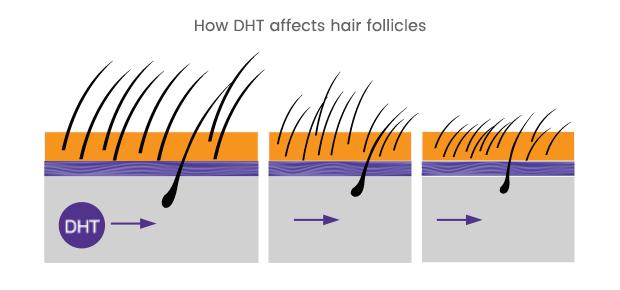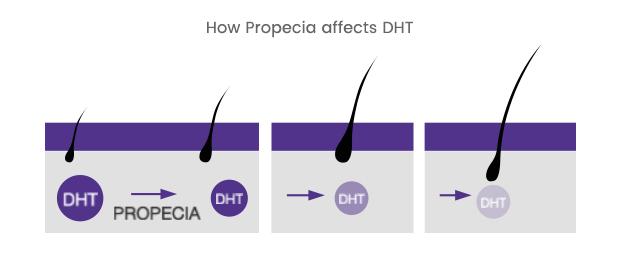- Male hair loss
- Finasteride
Finasteride
A clinically proven treatment for hair growth
Including Rx and delivery
Before and after
In clinical trials, after one year of finasteride treatment, men reported:
Higher hair count
Increased thickness
Reduced shredding
Before

Male with significant thinning of the vertex.
After

Significant regrowth of scalp hair in the vertex area.
Before

Diffuse thinning of the frontal scalp and vertex is noted.
After

The frontal scalp and temporal scalp hairs are becoming dense.
Before

Note that the vertex of scalp is nearly void of hair.
After

The view of the vertex demonstrates substantial hair growth.
Before

Scalp demonstrates overall thin hair distribution.
After

Hair density has increased significantly and diffusely.
Before

Temporal scalp demonstrates recession.
After

Frontal scalp and hairline are much thicker.
Before

Anterior scalp demonstrates major thinning.
After

Regrowth at the temporal and anterior scalp.
How to take

Take 1 pill daily
Finasteride, also known by its brand name Propecia, is available in tablet form.
Take one tablet daily, at any time, with or without food. Do not break, crush, or halve the tablets.

Dosage
Finasteride 1mg tablets are prescribed by doctors to treat hair loss.
Please note that taking more than your prescribed dosage will not make finasteride work faster.

Visible results
Finasteride works, so don’t stop too early. Studies show a 65% reduction in DHT levels just 24 hours after taking your first dose.
However, since hair growth takes time, visible results will appear after 3-6 months.
- Price is all-inclusive.
Free consultation.
Free prescription. - Free shipping.
Delivery in 2-5 days.
Discreet packaging. - Free shipping.
Next-day delivery. - No insurance needed.
No face-to-face.
No prescription needed.
Order anytime, anywhere.




Finasteride FAQs
What is Finasteride (Propecia)?
Finasteride (Propecia) is an FDA-approved medication. Finasteride effectively treats hair loss and diffuse thinning, which is when there is uniform hair thinning across the entire scalp. It works by slowing down the rate of hair loss and also helps with hair regrowth.
Finasteride also has other uses, including the treatment of enlarged prostate glands (benign prostatic hyperplasia - BPH).
There are two strengths of Finasteride available:
- Finasteride 1mg tablets is prescribed by doctors to treat hair loss. The brand name for this product is Propecia.
- Finasteride 5mg tablets are mainly used to treat BPH. The brand name for this product is Proscar.
At SpeedyHealth, we currently only offer Finasteride (Propecia) 1mg tablets for the treatment of male pattern hair loss. If you are considering using this medication for another condition, we recommend contacting your regular doctor.
Is Finasteride a generic version of Propecia?
Propecia and Finasteride are the same medications. Finasteride is the active ingredient and generic name. Propecia is the brand name made by the company Merck & Co.
A generic product shares the same features as its branded version and people use it in the same way. Small differences in the binding and inactive ingredients may be present across brands.
The product price and manufacturer may also vary, with generics usually being a lot more affordable.
How does Finasteride work for male hair loss?
When your body produces testosterone, it converts a small amount into the androgen dihydrotestosterone (DHT). High DHT levels cause hair follicles to shrink and can shorten the hair growth cycle, leading to hair loss.

Finasteride belongs to a class of medicines known as 5-alpha-reductase inhibitors. These stop the enzymes from converting testosterone to DHT. Reduced DHT levels in the scalp, decreases the effect of DHT on the hair follicles. This reverses the process of hair loss and increases hair growth.

How fast will I see results?
Finasteride (Propecia) works differently for everyone. However, daily use usually leads to visible improvements when taken for 3 months or more.
To achieve and maintain maximum benefits, continue with long-term treatment. If you find that Propecia is not working for you after 12 months, talk to your doctor.
Results of clinical studies involving men with male pattern hair loss have shown:
- 83% of men taking finasteride experienced no further hair loss compared to 28% of men on the placebo (an inactive drug)
- 66% of men on finasteride also saw hair regrowth compared to 7% taking the placebo
There was also an improvement in hair count over 1 year. Participants maintained these results throughout the second year of treatment.

How do I take Finasteride (Propecia) for hair loss?
- Take one 1mg tablet daily, with or without food.
- Do not break, crush, or halve tablets.
- In general, our doctors recommend a course of at least 6 months to see the treatment's full effects.
- If you miss a dose, simply skip the missed dose and take the next dose at your usual time. Taking too much Finasteride may result in a higher chance of side effects.
What happens if I stop taking Propecia?
Stopping treatment means DHT levels in the scalp will rise again. This leads to a reversal of effects within 9 to 12 months.
Can I combine Finasteride and Minoxidil?
Minoxidil is a topical treatment that works by increasing blood flow to the scalp. This increases the size of the hair follicles, which allows hair to be produced.
Doctors have safely prescribed these medications together, but more scientific research is necessary for further insights.
Who can use Finasteride?
Finasteride is only indicated to treat male pattern hair loss in men. Starting treatment in the early stages of hair loss is crucial. Clinical trials show that Finasteride is safe and effective in men (aged 18 to 41) with only mild to moderate hair loss of the scalp.

Who should not use Finasteride?
Women and children should not use Finasteride, especially women who are pregnant or breastfeeding as it may cause birth defects. If a pregnant woman or child comes into contact with Finasteride, they should consult their doctor immediately.
Avoid taking this medication if:
- you are allergic to any of the ingredients in this medication
- are already taking other 5α-reductase inhibitors for BPH
Use with precaution:
- If you are lactose intolerant, consult your doctor before taking this medicine. Finasteride and Propecia tablets contain lactose (a type of sugar).
- Finasteride can affect the results of prostate blood tests, as it decreases the blood levels of your Prostate Specific Antigen (PSA). If you undergo prostate cancer screening, inform your doctor about your use of this medication.
- Tell your healthcare provider if you have any medical conditions, including those that affect your prostate or liver.
Interactions with other medicines
Other drugs may affect how Finasteride works. Always inform your doctor about the medications or supplements you are taking. This includes over-the-counter medicines, herbal products, and vitamins, obtained without a prescription.
For further information, refer to the patient package insert included with your order.
What are the side effects of Finasteride (Propecia)?
In clinical trials, men tolerated finasteride well, with most patients reporting no serious side effects. However, like all prescription medications, some side effects can be experienced.
Finasteride’s side effects most commonly include:
- trouble getting and maintaining an erection (erectile dysfunction)
- a decreased sex drive
- a reduced volume of ejaculate
For a full list of side effects, refer to the medical information included with your order.
Allergic reactions
If you have a severe allergic reaction, stop treatment and seek medical attention. The signs may include:
- skin rashes or hives
- swelling of the lips or face
- difficulty breathing or swallowing
Breast tissue changes
You should inform your doctor as soon as possible if you experience changes to your breast tissue this includes:
- breast pain
- discharge
- lumps
Although not all changes suggest breast cancer, it is important to get these checked.
A rare side of Finasteride is depression. If you have depressive thoughts, you should stop treatment and contact your doctor.
If you experience any side events whilst taking this medication, please speak to a healthcare professional.
Can I buy Finasteride (Propecia) online?
You can purchase Finasteride 1mg (Propecia) tablets online from SpeedyHealth. You must first complete an online consultation.
Our doctors will review your answers to decide if it is safe to prescribe you the medication or not. If they do not approve, you will not be charged.
If they approve, they will issue a prescription to our pharmacy. The pharmacy will then package and dispatch your order.









